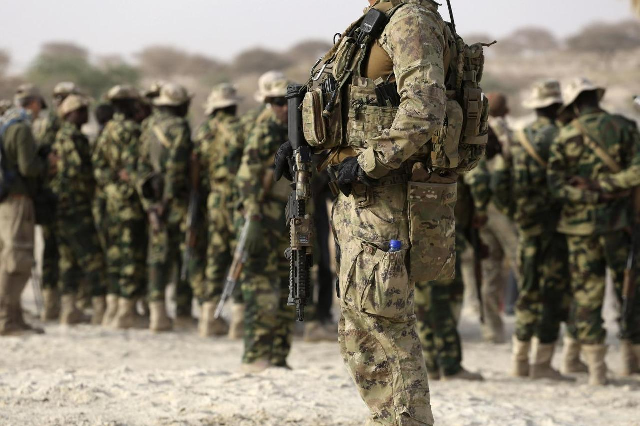US threatens to withdraw troops from Afghanistan
Announces $1b aid reduction after Ghani, Abdullah refuse to end differences

Announces $1b aid reduction after Ghani, Abdullah refuse to end differences
The development came after US Secretary of State Mike Pompeo failed to break a deadlock between Ghani and Abdullah.
Ghani, who is Afghan president since 2014, was declared a winner in February in a controversial election. His rival Abdullah, who was part of unity government previously, also claimed victory and held separate swearing in ceremony.
In order to make them agree to an inclusive government, Secretary Pompeo travelled to Kabul despite the threat of coronavirus. He held marathon meetings with Ghani and Abdullah but couldn't convince them for a power sharing deal.
On his return to Washington, Secretary Pompeo issued a blunt and harsh statement, threatening to walk away from Afghanistan as per the deal signed with the Taliban.
"The United States deeply regrets that Afghan President Ashraf Ghani and former chief executive Abdullah Abdullah have informed Secretary Pompeo that they have been unable to agree on an inclusive government that can meet the challenges of governance, peace, and security, and provide for the health and welfare of Afghan citizens,” said a State Department statement.
It said the US “is disappointed in them and what their conduct means for Afghanistan and our shared interests”.
"Their failure has harmed the US-Afghan relations and, sadly, dishonours those Afghan, Americans, and Coalition partners who have sacrificed their lives and treasure in the struggle to build a new future for this country."
Because this leadership failure poses a direct threat to US national interests, effective immediately, the US government will initiate a review of the scope of our cooperation with Afghanistan, the statement noted.
US Secretary of State Pompeo visits Kabul amid multiple crises
"Among other steps, we are today announcing a responsible adjustment to our spending in Afghanistan and immediately reducing assistance by $1 billion this year. We are prepared to reduce by another $1 billion in 2021," Secretary Pompeo said.
"We will also initiate a review of all of our programs and projects to identify additional reductions, and reconsider our pledges to future donor conferences for Afghanistan," he added.
"We have made clear to the leadership that we will not back security operations that are politically motivated, nor support political leaders who order such operations or those who advocate for or support parallel government," he said in an usually blunt remarks.
The statement clearly shows the anger on the part of the US, which signed a deal with the Taliban on February 29. The next phase of the deal was supposed to be the start of intra-Afghan talks. But before the intra-Afghan dialogue, Afghan authorities were supposed to release 5,000 Taliban prisoners while insurgents were also set to free 1,000 Afghan security personnel.
President Ghani, however, agreed to free only 1,500 Taliban prisoners in the initial phase while linking the release of the remaining inmates with the start of intra-Afghan talks as well as reduction of violence by the Taliban.
What has compounded the process further was the internal wrangling in Afghanistan that prevented the formation of all inclusive Afghan delegation to start talks with the Taliban.
Secretary Pompeo said the United States remains convinced that a political settlement is the only solution to the conflict.
"We note that Afghan leaders are acting inconsistently with their commitments under the Joint Declaration, chiefly failing to establish an inclusive national team to participate in intra-Afghan negotiations or take practical steps to facilitate prisoner releases by both sides as a confidence-building measure to reach a political settlement and achieve a permanent and comprehensive ceasefire."
"We are proceeding with the conditions-based withdrawal of our forces in accordance with the US-Taliban agreement," the statement said in a clear warning that the Trump administration is ready to walk away from the war-torn country even if the Afghan government and other players are not ready to abide by the deal.
However, the US left the room open for reviewing its strategy.
"Should Afghan leaders choose to form an inclusive government that can provide security and participate in the peace process, the United States is prepared to support these efforts and revisit the reviews initiated today," the statement further said.
Pompeo also made it clear that the United States is not abandoning “our partnership with Afghanistan, nor our commitment to support the Afghan security forces, but reviewing the scope of our cooperation given the irresponsible actions of Afghan leaders”.
"To illustrate America’s steadfast commitment to the Afghan people, the United States will be providing $15 million in assistance to help combat the spread of the coronavirus in Afghanistan," he said.
Commenting on the US move, a senior Pakistan official said Islamabad was closely following the developments in the neighbouring country.
The official, who spoke on the condition of anonymity, told The Express Tribune that Pakistan was aware of the challenges to the Afghan peace efforts but never knew the process would receive set back at such early stages.
The official hoped that better sense prevails in Afghanistan and all stakeholders would cease this rare opportunity to bring long term peace and stability to their country.



1724319076-0/Untitled-design-(5)1724319076-0-208x130.webp)















COMMENTS
Comments are moderated and generally will be posted if they are on-topic and not abusive.
For more information, please see our Comments FAQ